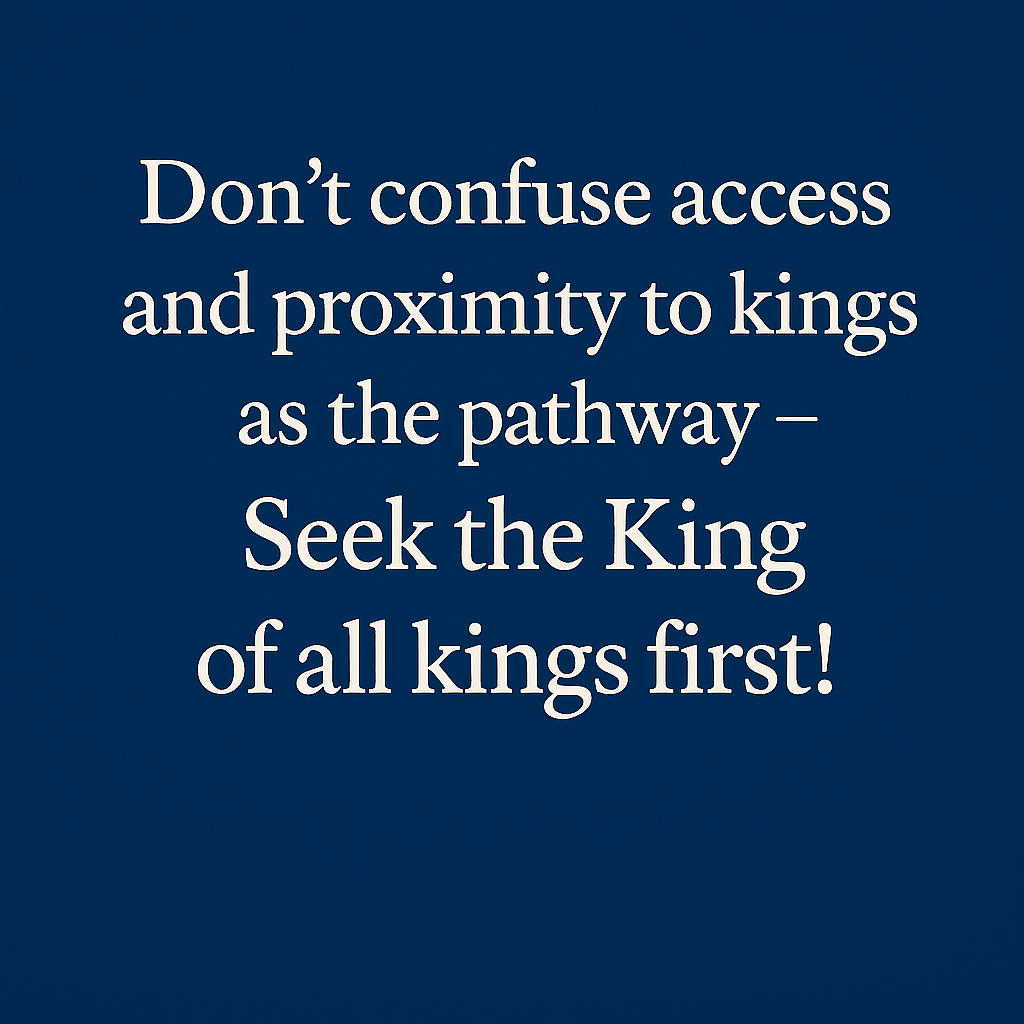Let me tell you a quick story about a man named Nehemiah. One fateful day, he received devastating news: the walls of Jerusalem had been broken down, and its gates burned with fire. When Nehemiah heard this, he sat down and wept. For several days, he mourned, fasted, and prayed.
At the time, Nehemiah was the king’s cupbearer—a position of close proximity to someone who could change his situation. Yet, instead of rushing to the king, Nehemiah chose to seek the King of Heaven first.
Now pause and consider this: Nehemiah was strategic. He didn’t take for granted his access to earthly power. Though he stood near the king, he understood that his nearness to God held greater weight. He sought divine counsel before human intervention.
Many of us forget this. When life throws challenges our way, we instinctively turn to the boss, the friend, the family member who might fix things quickly. We rely on proximity to people who seem to hold solutions. But don’t let access to earthly help distract you from acknowledging the Lord over all things and people—the One who holds every king’s heart and turns it wherever He wills (Proverbs 21:1).
Nehemiah understood this. He knew the importance of seeking God first. Your proximity to the King of Heaven is of utmost importance.
I hope this is sinking in.
Let’s take another lesson from Nehemiah. In chapter 1, verse 4, the Bible tells us that when Nehemiah heard the news, he wept, mourned, fasted, and prayed. But his prayer wasn’t emotional in the way we often approach God. It was strategic. He evaluated himself, confessed the sins of Israel—including his own—and reminded God of His promises.
Too often, we approach prayer emotionally, rehearsing our pain and telling God how deeply we’re affected, as if He’s unaware of our struggles. Nehemiah could have prayed, “Lord of Heaven, why have You allowed this? You’ve forsaken us. Our fathers sinned—why are we being punished? This is unfair.” That kind of prayer, though heartfelt, lacks spiritual grounding.
Instead, Nehemiah prayed with understanding. He acknowledged Israel’s disobedience and brought God’s promises back to Him. He presented strong reasons, just as Isaiah 41:21 encourages.
Furthermore, Nehemiah didn’t go to the king saying, “O King, I’ve served you faithfully for years. You know I’m a good man. Now help my people. I’m sad and pained. This is unfair.” No—he didn’t rely on emotional appeal or entitlement.
We must stop praying without root or understanding. In chapter 2 of the book of Nehemiah, Scripture records that Nehemiah found favour before the king and queen, and his request was granted. As you read further, you’ll see how marvellously God blessed and prospered everything Nehemiah did. This wasn’t the result of emotional prayer or misplaced trust in proximity—it was the fruit of spiritual strategy and divine favour.
Queen Esther understood this too. When she learned of Haman’s plot against the Jews, she didn’t say, “I’m the queen—how dare he! I’ll go to the king and report him.” Though she had rare access to the king, Esther knew that true authority rests with God. She fasted and prayed, recognizing that even earthly kings bow to the King of all kings.
Queen Esther did not misuse her status. Yes, she was a queen—but she knew the right way to approach: first, the King of all kings, before King Xerxes. She understood her position well. It wasn’t merely physical—it was deeply spiritual.
She recognized that the true battle had to be fought first in the place of prayer, before the throne of an earthly king. Perhaps you believe that because of your high status in society, you no longer need to spend time in prayer—or God forbid, in fasting. But Esther understood her assignment. She discerned the fine line between pride, which leads to a fall, and humility before the God of heaven, which leads to success.
I pray you receive this revelation, brothers and sisters. You may be esteemed and influential now—sitting before kings and princes, among high-caliber individuals, captains of industry. Or perhaps you are one of those captains, greatly blessed by God. Still, do not confuse proximity to power with the pathway to divine favour. Always give honour and reverence to the God who makes all things.
My friend, don’t mistake proximity for power. Don’t confuse access with the ultimate answer. Go to God—the doer of all things. Pray, fast, seek His face, and trust Him. He will guide and direct your path.
This may be the answer you’ve been praying for. Let lessons from Nehemiah and Esther guide you today.
God bless you all.








